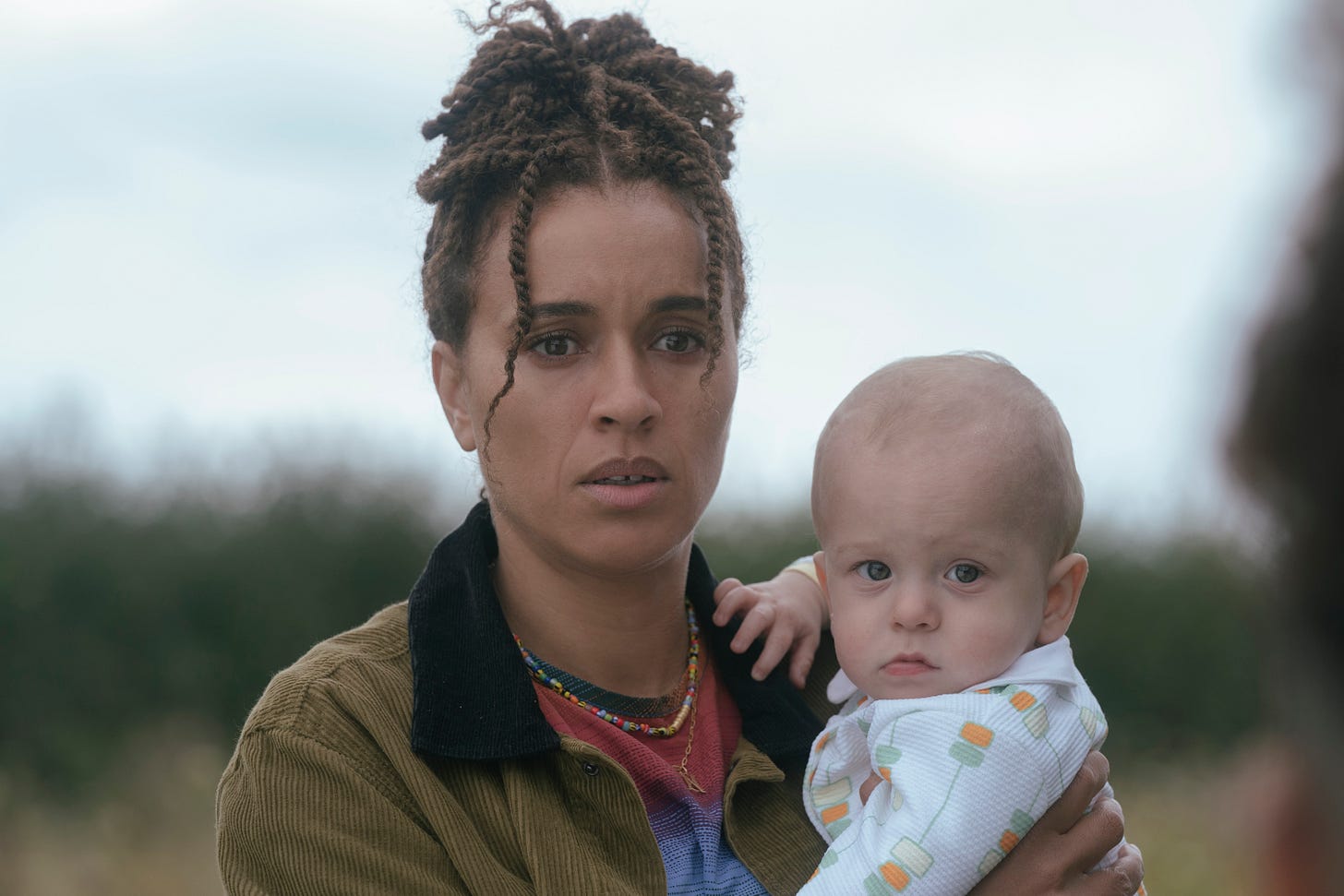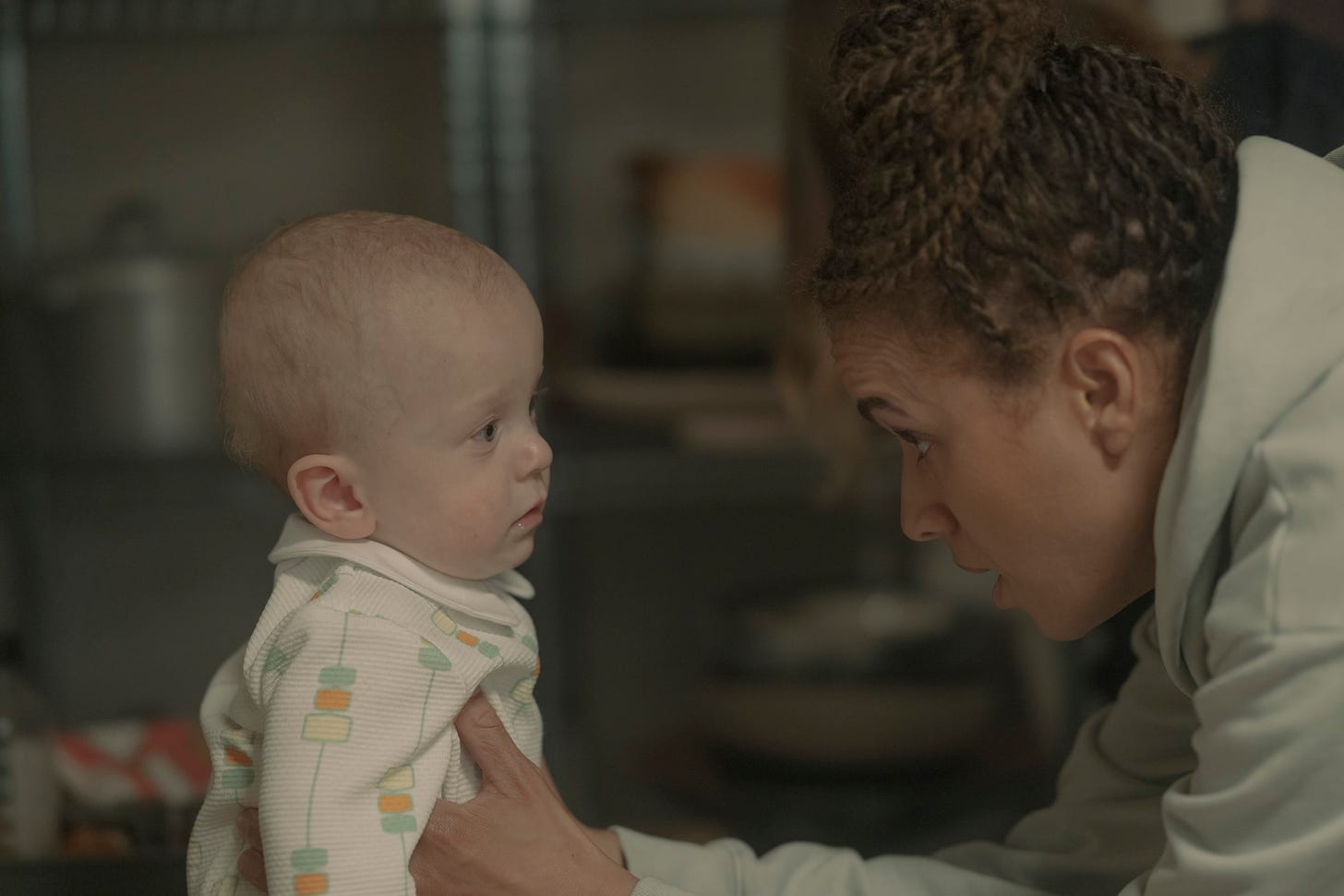The Baby: nailing the truth about motherhood
The excellent new Sky Atlantic horror-comedy digs into the reality of parenting
The most horrifying moment in the new Sky Atlantic show The Baby is not when a woman silently chokes to death or even when a baby (the baby) spectacularly shits himself. In fact, no blood, guts, gore or faeces can come close to the terror struck by three little words uttered in episode one. A question that single and baby-free thirty-something Tasha (Michelle de Swarte) asks her friend Mags (Shvorne Marks).
“Is it better?” she asks, gesturing at the baby balancing on Mags’ knee.
A silence and then: “Dunno. It’s hard to explain”.
It’s a brilliant, simple bit of writing (Lucy Gaymer and Sian Robins-Grace co-created and co-wrote The Baby) skewering umpteen notions about motherhood (I’ll come back to this later). And as a horror comedy - it not only nails both genres beautifully, without the horror deflating the comedy and the comedy sucking the stakes out of the horror - it uses tropes and techniques (blood red titles, tense score, a sprinkle of slapstick) to present a raw, grotesque and yet frighteningly-real picture of parenting and motherhood.
The eight-parter follows chef Natasha - who definitely on no account wants a child and is bemused that her mates do - after a baby literally falls out of the sky into her arms one day. Whatever happens, she just can’t shake the baby (who turns out to be murderous) and Tash’s family and friends become more concerned the longer he sticks around.
The commonalities with the likes of It’s Alive, Prevenge and Rosemary’s Baby are clear, but like Titane, it kicks against the traditional man meets a woman and gets her up the duff narrative. It’s a story of family and caring. Of the struggles of many to gain what is gifted to others so easily. Of what it is to both be a mother and to mother. Of what it is to not want to be a mother. Of what we pass on to our children, and what they pass back. The stories that begin whenever someone parents, however that child comes into their life.
I’ll tell you my story. But as The Baby shows: there are so many more to be told and to be heard. This is only mine*.
(*contains birth talk)
I knew exactly where Tasha was - her face betraying shock and panic - when the baby dropped from the black sky and claimed her. Hour one after your kid is born: when your body still hasn’t fully been returned to you and lies against the sheets like butter melting. When you have a question you overwhelmingly want to ask: ‘why has someone just dropped a baby in my lap, out of the blue? What am I meant to do?’ Even though you remember full well, know rationally, that they carved you open and pulled it out of you. And that before the cutting and pulling, it had been there inside for eight months and two weeks. But now it’s here, on you, only 5lbs 1oz but filling every bit of space in the room. You’re high as a kite on your feelings for him; feelings which you can’t think of a word for and so settle for ‘love’.
And you realise you won’t ask that question, because no-one will answer it, and focus on the hours ahead of of feeding (them) and sleeping (them) and crying (both of you). Normally, those hours take the shapes of days, which themselves are then weeks. But after the birth, the bit of your brain that understood things like that has been crowded out by all the new rules on feeding, sleeping and crying.
So the seconds melt into minutes and hours and days under the glare of the yellow lights which are never dimmed. And you don’t know when it’s daytime and when it’s nighttime because the lucky cow in the bed next to you got the window, and you have your curtains pulled around twenty-four-seven like the other five women in the other five beds.
On what could be day two or day three, or night two or night three, you start hallucinating and believe that you’re at home in bed and that there is no baby, the yellow lights bringing you back to reality like the cat’s eye seeing you home.
The shock of the baby suddenly existing in the world won’t wear off for several months. Sometimes you wake up in the middle of the night, worried you’ve forgotten something, worried you’ve forgotten that you’ve had a baby.
Alongside it will sit the shock of the birth. You realise now why when you were pregnant other women insisted on peeling themselves back, of showing their scars. They were trying to let you know what lay ahead, in the hope that you might not be shocked like they were. Each story the same and yet entirely unique. The moment the scalpel cut or the alarm sounded or a heartbeat plummeted different each time, even when so many of the words were the same.
You feel like you’ve been through something terrible, that something entirely terrible has happened - been done - to your body. You feel guilty for letting it be cut open, You get scared of anything going in and anything coming out. You soap it softly and turn down the boiling-hot tap. You tell it that you’re sorry. You’re sorry you weren’t more prepared for the shock.
You regret not thinking of a name for those feelings when you were named him, but you didn’t know then what it would feel like.
But let’s return to Tasha’s question “Is it better?”. And Mags’ response, “Dunno. It’s hard to explain.”
The “dunno” speaks to an unspeakable truth.
That truth: that it is both better and worse.
But it’s terrible to say that, right? You absolutely shouldn’t say that. You should stop at better and whisper the worse only to yourself. Mags should have immediately, without pause said, "of course” or “that’s when your life truly starts” or “yes, you know real love for the first time”. That’s what we expect mothers, parents to say.
And this is the question every person deciding whether to become a parent silently turns over: this unknown life, that will only become familiar to you when you’re knee-deep in it…will it be better? Better than the one you already live? Better than the one you could have? After all, it’s a baby, not a steak to be sent back when the grease turns red.
As Mags puts it: “It’s just a lot you know. All the time, forever”.
All the time.
Forever.
So no, it’s not always better (a non-exhaustive list):
In those early days, if you believed in such things, you’d be sure you were possessed. That you’d been taken over and made Mother by something bigger than you, something beyond your control. You push the pram past the shop window, catching sight of yourself, the one-woman play. Your flinch seeing your hand on the handle.
Your body is no longer yours, but belongs to him. Just as when he was inside, he has to take, take, take from you on the outside too. He grabs and pulls and his needs are everything and you can’t seem to ever meet them fully. You are emptied out, every day, not a drop left.
Freedom. The lunches, the dinners, the parties, the writing, the trips to the pictures, the trips to other countries, the mornings in bed, the evenings anywhere but. You watch the Instagram Stories of your child-free friends under the covers at 3am, greedy for the life contained in the screen. Time alone becomes scarce. You pretend to go to the toilet and slide the lock across. You sit quietly for a moment, the need for you on the other side of the door. Sometimes you put your fingers in your ears.
And yet…
It absolutely is better (also a non-exhaustive list):
Your body afterwards, throbbing with oxytocin, feels like it might have been to war, but it’s been victorious. You cannot believe what it’s capable of. You feel like you can run up a mountain carrying a goat, even though the thick scar on your bikini line and the severed muscles underneath say otherwise as they sing in pain.
Mothering. You are surprised by how much you enjoy caring for, tending to him. A comb through red hair. Cream rubbed into flesh. A hot mouth feeding. The cry retrieving you from sleep like a shipwreck brought to the surface. Your focus narrows to him: what he eats, when he sleeps, when he shits. You realise that you’ve been wrong all these years: that maternal isn’t something you are or aren’t. Mothering is something you do. All of those fears, borne from your relationship with you own mother, turn to dust as soon as he makes contact with the air. The cycle breaking the second you mother him, a bell rung.
The people they become. They change from being a beautiful well of need to being magical tiny humans. A person you love being around as a personality breaks through the surface. They’re funny, and curious, and bright (yes, they’re almost certainly brighter than all the other kids in the world). They say your name, Mummy. They reach out for you, damp with sleep and sweat and your skin sticks to his. They decide they don’t need to hold your hand while walking down the street, back straight with independence. As he separates from you, becomes himself, you both ache and cheer.
And the big one. Those feelings. Waves that crash inside, prompting you to cry when the wall is about to be breached. You don’t know how to measure it, to contain it. You relent: allow it to flood, every inch of you alive to it.
I still don’t have a word for it: those feelings. So for now, I’ll stick with love.
All the time.
Forever.
All episodes of The Baby is on Sky Atlantic/NOW







Ugh, you made me cry on the train platform. So beautifully written. I don't like horror but I'm going to watch this.
What a way with words you have mate!. You’ve put so beautifully all these feelings, little pains, big pains little joys and happiness that becoming a mother mean, specially birthing. It’s so complex yet so instinctive, like being asked to land a plane safely without having attended flying school.